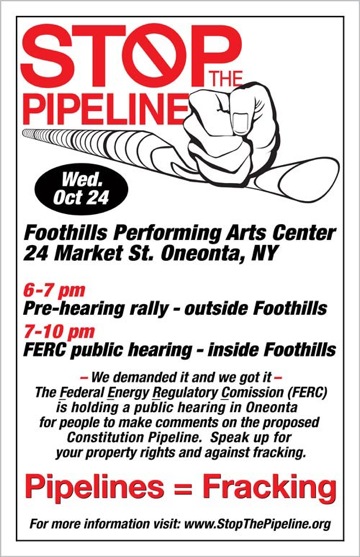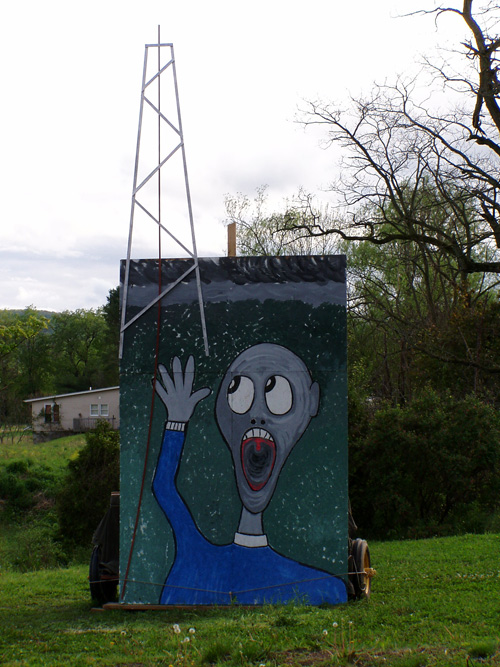There is a cynical, intentionally misleading letter going around to people in Otego. It was sent by people who wouldn’t mind seeing Otego ruined in order for a very few people to make a fast, unearned buck.
Nothing wrong with a fast, unearned buck, but not if you have to lie to the rest of the town to make it seem like it’s good for them, with no danger of pollution and destroying land values and turning the the town into an industrial sacrifice zone.
The intention of the letter is to manipulate well-meaning people who don’t understand much of the issue, yet. A lot of landowners have been wooed by the lies about “free money.” The letter in question, written by shills for the gas drilling in our area, makes a lot of unsubstantiated claims about how “safe” gas drilling is, and they leave out all the cases of pollution, endocrine decease, greenhouse effects, etc. They conveniently ignore science, and would like you do do the same.
Fortunately, there was one tell-tale truthful statement in the letter – it mentioned that fracking really did effect water quality. (It must have missed their “non-truth-o-meter.”)
You can find out some of the ways that the shills for the gas industry lie at http://otegony.com/spinning-the-truth-about-horizontal-fracturing.
Below. you will find a guest post from Stuart Anderson rebutting some of of the gas-propaganda in the above-mentioned letter.
An excellent discussion of tax revenues to local governments is available at:
http://www.tompkins-co.org/detail.aspx?ContentID=1935
The gist of the article seems to be that there is currently a lack of taxation schemes to bring on such revenues, and that they will be slow to develop. For wells that are drilled but not extracted (temporarily capped while waiting for gas prices to improve) the wait for tax income (and royalties) may be many years.
The impact of gas drilling on property values appears to be a yo-yo effect. First gas speculators drive up local land values in hopes of making money on gas leases and royalties (this phase has already passed.) Then prices for small residential properties fall as banks are reluctant to issue mortgages on homes that may be impacted by drilling and fracking. See: http://www.nytimes.com/2011/10/20/us/rush-to-drill-for-gas-creates-mortgage-conflicts.html?pagewanted=all and http://thedailystar.com/localnews/x161015780/Agents-Gas-leases-affecting-land-values
Once the gas is gone, it is hard to imagine that the experience of having been fracked and pipelined will have done anything to enhance the value of area properties.
Comparisons with Chautauqua County in far western NY
(see here: http://andyarthur.org/fodder/energy/whatdoesnatural.html
and here: http://www.pressconnects.com/article/20100404/NEWS01/4040356/Activist-challenges-DEC-claim-few-gas-drilling-problems
Over 6,000 holes dot the landscape of this scenic county, as the typical drilling area is only 40 acres. The gas-bearing stone is not easily fracked in horizontal holes, so these wells are all vertical-only, and have required small scale fracking. Thus the wells of Chautauqua County have been fracked with only a few truckloads of fluids per well, not the hundreds per well that are needed for horizontal fracking.
While 5,000 of these wells are listed as “currently active”, in reality this number is greatly inflated: the gas companies only have to putter a little around each wellsite once each year to renew the “active” status for another year, regardless of how little (if any) gas is being extracted. They do this to delay the costs of permanently sealing the well if it becomes “inactive.”
Local roads are likely to suffer under the great increase in heavy truck traffic required to move water to and fracking wastes away from the drilling sites. The DEC has yet to specify what is to be done with the waste. The following is excerpted from a letter sent to the Otego Town Board after their February meeting:
You heard it from Ms. Westfall’s [the Town attorney, a partner in Coughlin & Gerhart LLP, which advertises on WSKG promoting their gas leasing services] own lips at your February meeting—if Delta has a conflict of interest in a court case between a driller and the Town, they will have to recuse themselves and we [the Town of Otego] will be searching for other representation. I’d be curious to know just what Delta said about the current condition of our roads. Do they report the surfaces look generally good but that they are unable to adequately assess the condition of the sub-base in most areas? When heavy trucks destroy roads, it is the sub-base that gives way, which then allows the surface to break up. When Delta walks away from us, the drillers will subpoena Delta’s report that says our roads were flawed to begin with, and we will be hung out to dry.
As for the County having, in Ms. Westfall’s words, “thoroughly vetted” Delta’s credentials and abilities, that will not do us any good at all if, when push comes to shove, Delta feels conflicted and decides to no longer represent us. Her claim to not know who Delta’s other clients “might be” is turning a willful blind eye towards a critical issue. Who but a gas driller pays an engineering company to do “gas well permit surveys and mapping”? Delta may very well be deep in the drillers’ pockets and may consider their efforts “on behalf of the Town” as reconnaissance work for the drillers.
Hiring the fox to guard the henhouse is worse than a poor plan; it gives the fox a look at the security system and guarantees his success. Ms. Westfall should be providing better advice for her fee.
The pro-drillers frequently offer job creation as a benefit to all, even non-landowners, in the region. While there can be little doubt that a “boom-town” atmosphere can be a short term boon to jobs in gas stations, motels, restaurants, and stores, there can also be little doubt that when the boom is over, those jobs will vanish in short order. If the Boom also happens to drive away the tourists who flock every year to our regional attractions, then the net may well be a loss of jobs. As for the “high paying” jobs, those jobs travel with the drilling rigs and the tankers. Gas wells require extremely little in the way of “high paying” maintenance jobs once everything is plumbed up and running.
Effects on population: In a report by Christopherson, S. & Righter, N.(2011). How should we think about the consequences of shale gas drilling from Cornell University http://www.greenchoices.cornell.edu/downloads/development/marcellus/Marcellus_SC_NR.pdf
they present this information on pages 24-25 of the report:
a) In 26 counties in the western United States where gas drilling has occurred, 16 of the counties lost population.
b) In Pennsylvania, from 1990-2008 the population in counties where gas was drilled had a 2.5% decrease in population contrasted with a 3.2% increase in population in adjacent counties.
Tags: Otego NY




